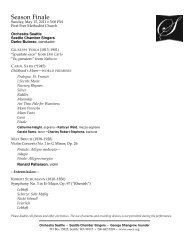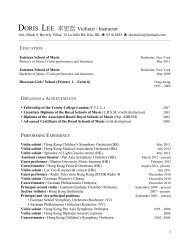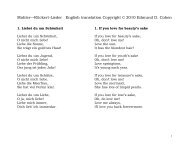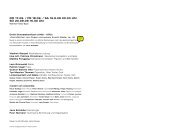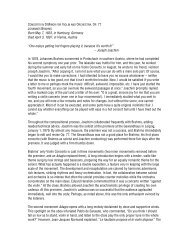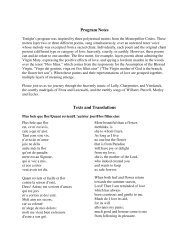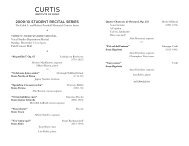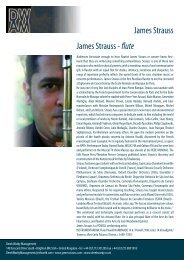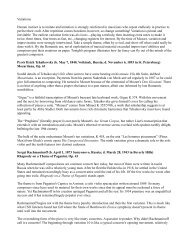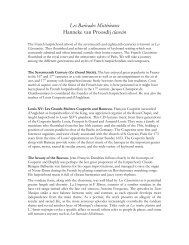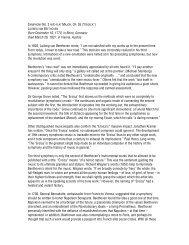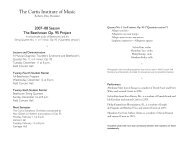Der fliegende Holländer - InstantEncore
Der fliegende Holländer - InstantEncore
Der fliegende Holländer - InstantEncore
You also want an ePaper? Increase the reach of your titles
YUMPU automatically turns print PDFs into web optimized ePapers that Google loves.
10 London Lyric Opera<br />
The psychology here is embedded in the<br />
music and the text. In his first groundbreaking<br />
monologue, ‘Die Frist ist um’,<br />
the Dutchman begins to take us where<br />
only Wagner’s characters dare to lead: to<br />
the inner depths of the mind and soul of<br />
man; to the centre of our human quest<br />
for identity. At the very start of the opera,<br />
we are delivered from the mere thrills<br />
and spectacle of a ghost ship – placed<br />
there by Wagner as a symbol of the old,<br />
supernatural-laden theatre he is about<br />
to topple – and we are plunged instead<br />
into our own haunted subconscious. The<br />
Dutchman is in fact the first in a long line of<br />
outsiders and outcasts in Wagner’s works:<br />
people with no name, sometimes with no<br />
known parentage. The outsider aspect<br />
was made shockingly clear in Katharina<br />
Wagner’s production a few years ago in<br />
Würzburg, with the Dutchman portrayed<br />
as a rather intellectual émigré or asylumseeker,<br />
finally kicked to death by a group<br />
of thugs in a wharf-side bar. Tannhäuser,<br />
Lohengrin, Siegmund, Tristan, Walter,<br />
Siegfried and Parsifal were to follow in<br />
his wake. This ‘identity crisis’ theme is<br />
to become Wagner’s obsession, his idée<br />
fixe, and the psychological lynchpin of<br />
all his works. This one question he will<br />
develop and refine through each of his nine<br />
subsequent operas: how do we discover<br />
who we really are?<br />
What is also of interest here is that the<br />
Dutchman is the only baritone among<br />
this gallery. Do we not feel here the pull of<br />
tradition working on the young composer?<br />
Marschner’s doomed spirits were baritones<br />
and the role of the Dutchman dutifully<br />
followed suit, but is notoriously high to sing.<br />
Is Wagner not creating here the Heldentenor<br />
identity for his future ‘outsiders’, moving<br />
them up a notch from anti-hero to full heroic<br />
status (vocally at least)? Yet is it not exactly<br />
the baritonal quality that we feel marks out<br />
the true Wagner tenors? Old habits die hard.<br />
This main theme of identity, of seeking out<br />
who you are, usually through the identifying<br />
love of another, is perhaps grounded in<br />
Wagner’s own disturbed childhood in<br />
this respect. Joachim Köhler concludes<br />
about Wagner’s parentage in his superb<br />
biographical study, Richard Wagner: The<br />
Last of the Titans: “Wagner spent his whole<br />
life puzzling the identity of his true father”<br />
(thanks to the all too apparent dalliances of<br />
his mother). Interestingly, hand in hand with<br />
this, the quest of the artist runs parallel.<br />
To know thyself, from Wagner’s own<br />
perspective, is also the autobiographical<br />
journey of an artistic creator, shunned<br />
by society, locked away in the ghost ship<br />
of his artistic vision, eternally doomed<br />
to wander the earth misunderstood.<br />
The Dutchman is thus the first of his<br />
autobiographical pictures of the suffering<br />
artist-pilgrim on the road to find his muse.<br />
But how does he turn this into music?<br />
And then into theatre? Listen to the<br />
Dutchman’s aria. The music moves with<br />
such ease from the external swell and<br />
ebb of a real sea storm into the inner<br />
tempest of the Dutchman; and from this,<br />
by contrast, out again to the serenity of<br />
his dream of redemption by a woman<br />
faithful to him unto death.<br />
LLO Dutchman_aw.indd 10 18/11/08 15:09:17




